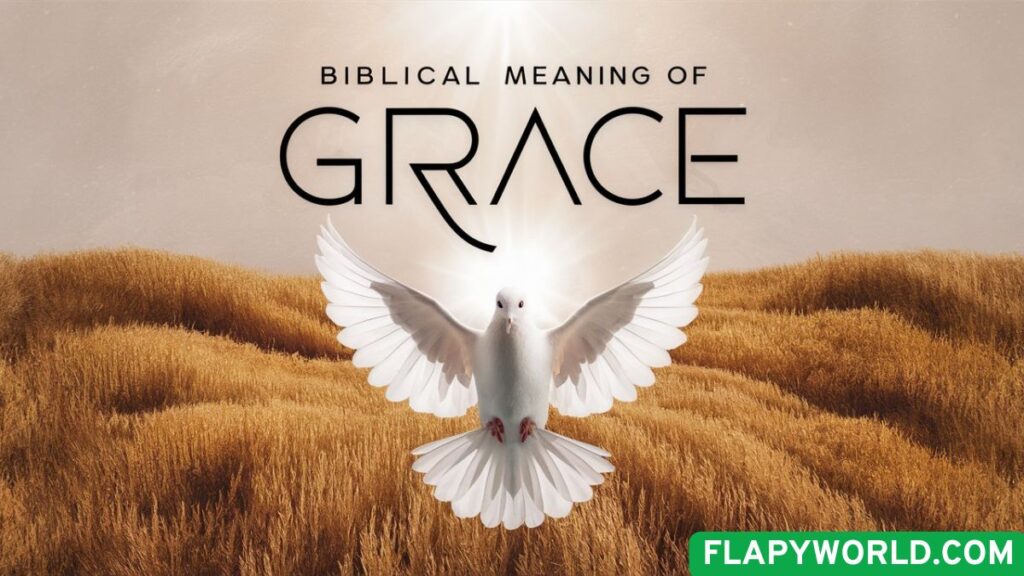Grace in the Bible means God’s unearned favor. It is His free gift to people, given without conditions. The Biblical Meaning of Grace shows God’s love, forgiveness, and power to save. It is not earned by works but received by faith.
Grace changes everything. It gives hope when life feels heavy. People long to understand it because it makes faith real. The Biblical Meaning of Grace touches the heart and shows God’s kindness.
The Bible speaks often about grace. It is seen in Jesus, full of grace and truth. It brings salvation, strength, and peace. The Biblical Meaning of Grace also means power to live above sin and to walk in God’s way.
What is the biblical definition of grace?
The biblical meaning of grace cannot be reduced to a single phrase. While many Christians summarize it as unmerited favor, the scriptures show that grace is also divine help and grace as God’s power working in believers. Paul writes in Titus 2:11 that the grace of God has appeared to all men, teaching us to deny ungodliness and worldly lusts. In other words, grace is both a gift and a teacher. It does more than save us—it shapes us into people who reflect Christ.
The grace definition in the Bible stands in sharp contrast to cultural definitions. In modern thought, grace often means elegance or simple kindness. The Bible, however, presents grace as the very energy of God at work in human weakness. In grace in weakness (2 Corinthians 12:9), Paul shares that God’s response to his struggles was, “My grace is sufficient for you, for my power is made perfect in weakness.” This verse reveals that grace is not passive pity; it is active strength.
Here is a simple comparison to show the difference:
| World’s Definition of Grace | Biblical Definition of Grace |
| Elegance or charm | God’s unmerited favor |
| Simple forgiveness | Divine ability to overcome sin |
| Politeness or courtesy | Grace as God’s power and divine help |
| Temporary relief | Grace and transformation for eternal life |
The grace in the New Testament shows that grace is inseparable from Jesus Christ. John 1:14 highlights that He came “full of grace and truth.” Grace is not just a concept but a Person, expressed through the life and work of Christ.
Our New-birth experience was by grace through faith
Salvation begins with grace and flows into faith. Paul makes this plain in grace and faith (Ephesians 2:8): “For by grace you have been saved through faith, and this is not from yourselves, it is the gift of God.” This means salvation is entirely dependent on grace as a gift of God. No amount of human effort, morality, or religious activity could ever earn salvation. It is an act of divine generosity.
Imagine receiving an inheritance you never worked for. That is what grace does. You cannot claim credit for it, yet it completely changes your life. This is the essence of grace and salvation. Grace awakens faith in the believer’s heart, making it possible to trust Christ. Without grace, faith itself would not exist. Grace is the spark; faith is the response.
The early Christians understood that salvation was not the result of personal righteousness but of grace and mercy connection. God loved us while we were still sinners, offering a new life through Christ. That is why Paul stressed that no one should boast in their salvation. The new-birth experience is not about human effort but about God’s intervention. Grace did what the law could never do: it saved us, transformed us, and united us with Christ.
Supply of grace is important for our salvation process

Grace is not a one-time gift you receive at salvation; it is an ongoing supply. Just as you need food every day to live, you need daily need for grace to grow spiritually. Paul teaches in Titus 2:11–12 that grace doesn’t stop at bringing salvation; it continues by training believers to live holy, upright, and godly lives.
The Christian life is a journey, and every step requires grace. We can call this spiritual growth through grace, where the believer learns, stumbles, and rises again through God’s strength. Grace and the Holy Spirit’s guidance are inseparable, for the Spirit reveals the Father’s will and empowers us to obey it. This is why Paul exhorts believers in 2 Peter 3:18 to “grow in the grace and knowledge of our Lord.” Growth happens only when grace keeps flowing.
Here is a clear picture of how grace functions in the believer’s life:
Grace → Faith → Transformation → Living a godly life with grace → Grace and eternal life
This chain shows that grace is the foundation, the power, and the destination. When the Bible says where sin increased, grace increased all the more (Romans 5:20), it highlights that God’s supply is greater than our failures. Grace does not excuse sin—it overpowers it.
Read Also: Rat Spiritual Meaning and Symbolism
Grace is the divine ability to live above sin
One of the most misunderstood aspects of grace is its connection to sin. Some assume that grace means freedom to live however we want, but scripture says otherwise. Paul’s words in Romans 6:1 confront this false idea: “Shall we continue in sin that grace may abound? God forbid.” The biblical meaning of grace is not a license but a divine ability to overcome sin.
This is where the concept of grace as God’s power becomes central. In examples of grace in scripture, we see men like David, who despite his failures, relied on God’s mercy and strength to rise again. Grace lifted him from guilt into renewed fellowship. In the story of Mephibosheth, grace took a broken man and placed him at the king’s table. Grace restores, empowers, and redefines.
Before Jesus, the law exposed sin but could not overcome it. This is the tension of grace vs. law (Moses vs. Jesus). The law increased trespass, but Christ came with grace to show sin can be conquered. This is why Jesus full of grace and truth is central. He embodied victory over sin and extended that same victory to us. Grace gives us what our flesh never could: power to say no to temptation and yes to God.
Strength to resist sin and please God
Grace is not only for salvation; it is for daily living. Believers face temptations, trials, and weaknesses, but God provides grace to endure and overcome. Grace in weakness (2 Corinthians 12:9) shows us that when Paul pleaded for his thorn to be removed, God assured him that grace was sufficient. Grace turned Paul’s pain into a platform for God’s power.
This truth explains the connection between grace and obedience. Obedience is not the product of sheer willpower but of God’s grace working in the heart. Grace makes it possible to love God’s commands, resist temptation, and pursue righteousness. The Bible says the righteous may fall seven times, but they rise again (Proverbs 24:16). What lifts them? Grace.
The grace and humility (James 4:6) principle shows that God gives grace to the humble. Humility opens the door to divine help, while pride shuts it out. Grace empowers believers to walk in holiness, not by personal strength but through reliance on God. This is the beauty of grace and transformation: it molds ordinary people into vessels of glory, making them able to please God in every season.
Living daily in God’s grace
Living in grace means walking daily with an awareness of God’s presence, strength, and help. Every challenge is an opportunity to lean on grace rather than self-effort. Grace sustains relationships, strengthens prayer, inspires forgiveness, and fuels perseverance. In grace in Christian theology, grace is not abstract—it is the believer’s oxygen.
Think of it this way: law commands, but grace enables. Law condemns, but grace restores. Law reveals weakness, but grace supplies strength. That is why the Christian life cannot survive without grace. It is more than doctrine; it is the very power of God enabling us to live a godly life, resist sin, and walk in fellowship with Him until the end.
Biblical Definition of Grace
The biblical definition of grace reveals God’s generosity in giving us what we don’t deserve. According to the grace definition Bible KJV, salvation is described as a free gift, not a reward for human effort. Grace combines unmerited favor with divine ability to overcome sin, making it more than forgiveness. It’s God’s power enabling believers to follow His will.
Grace appears throughout scripture as God’s ongoing provision for His people. Paul emphasized that we are saved by grace and faith (Ephesians 2:8), showing grace as both a starting point and a lifelong supply. Unlike cultural definitions, grace is active. It teaches, transforms, and empowers us to grow in holiness. Without grace, no one could enter or sustain a Christian life.
Examples of Grace
The Bible provides powerful examples of grace that help us understand God’s heart. David’s forgiveness after adultery, Israel’s repeated restoration after rebellion, and the thief on the cross all reveal grace as God’s mercy and favor extended in unexpected ways. Grace restores broken lives, bringing transformation and new beginnings that no amount of human effort could achieve.
Another striking example is Mephibosheth, crippled and forgotten, yet welcomed to King David’s table. His story illustrates how grace lifts the unworthy into a place of honor. In the New Testament, believers experience grace in the New Testament through Jesus, who came full of grace and truth. These moments show grace is not abstract—it is God’s love in action.
The Importance of Grace
The importance of grace lies in its role as the foundation of Christianity. Without it, salvation would be impossible because no human can meet God’s standards. Grace bridges the gap between human weakness and divine holiness. It sustains believers daily, providing strength to resist sin, grow spiritually, and walk faithfully with God despite life’s struggles and temptations.
Grace also distinguishes Christianity from works-based religions. While others emphasize effort or ritual, the Bible highlights grace as a gift of God. Paul explained that grace reigns through righteousness to bring grace and eternal life. Grace not only saves but also transforms, offering hope beyond human achievement. This makes grace the heartbeat of Christian theology and Christian life.
Responding to Grace

When God gives grace freely, the right response is humility and obedience. Scripture says, God gives grace to the humble (James 4:6). Grace is not meant to be abused as an excuse for sin but embraced as the strength to overcome it. Our response should reflect gratitude, obedience, and spiritual growth through grace that shapes us into Christ’s likeness.
Living in response to grace means relying on God’s power daily rather than trusting in our strength. Paul declared in grace in weakness (2 Corinthians 12:9) that God’s grace was sufficient even in trials. Believers respond best by walking in grace and obedience, allowing the Spirit to guide them. True response brings transformation and honors God’s unearned generosity.
Read Also: Spiritual Meaning of 4 Crows: Signs You Should Not Ignore
Grace and Mercy Connection in the Bible
The grace and mercy connection in the Bible highlights two sides of God’s love. Mercy withholds the punishment we deserve, while grace gives blessings we could never earn. For instance, Israel often escaped judgment by God’s mercy, yet still enjoyed provision, guidance, and promises through His grace. Together, they reveal God’s heart as both just and compassionate.
David’s story also illustrates this connection. God’s mercy forgave his sin, and God’s grace restored his throne and calling. This balance runs throughout biblical verses about grace (Romans, Titus, John). Grace empowers a new beginning, while mercy erases past guilt. Together they shape grace in Christian life, revealing God’s character as both a righteous judge and a loving Father.
Grace and Transformation in Christian Life
The power of grace does not leave believers unchanged. Instead, grace and transformation go hand in hand. Grace not only saves but also sanctifies, molding believers into the image of Christ. It gives strength to resist sin, empowers holiness, and fuels endurance through trials. Grace is dynamic, actively shaping every part of the Christian journey.
Through grace and the Holy Spirit’s guidance, believers gain divine strength to live differently. Titus 2:11–12 teaches that grace trains us to deny ungodliness and live godly lives. This proves grace is more than pardon—it is power. The Christian life thrives on this transformation, proving that overcoming sin through grace is possible as believers reflect the holiness of Jesus.
FAQ’s
What are the 4 types of grace?
The 4 types are prevenient grace, saving grace, sanctifying grace, and sustaining grace. Each reveals God’s favor in different stages of spiritual life.
What is the general definition of grace?
Grace means God’s unmerited favor, His free gift of love and help to humanity, given without earning or deserving it.
What are the five characteristics of grace?
Grace is free, undeserved, sufficient, transforming, and continuous, showing God’s love and power in every believer’s journey.
What is God’s means of grace?
God’s means of grace are His chosen channels—Word, prayer, sacraments, and fellowship—through which He strengthens faith and gives blessings.
What are the five elements of grace?
The five elements are forgiveness, renewal, empowerment, divine help, and eternal hope, all showing God’s active work in Christian life.
Conclusion
The Biblical Meaning of Grace is simple but very powerful. Grace means God gives love, help, and forgiveness even when people do not earn it. It is a free gift from God that saves, heals, and changes lives. Grace shows the kindness of God through Jesus, who came full of grace and truth. It helps people walk with God every day, making life stronger and more hopeful. Grace is not something people can buy or work for. It is always given by God because He loves His people.
The Biblical Meaning of Grace also teaches believers how to live better. Grace gives strength to resist sin and courage to follow God’s way. It helps Christians grow in faith and become more like Christ. Through grace, people learn to forgive others and show love in daily life. Grace is the reason a believer can keep moving forward with peace in the heart. It is God’s gift for salvation and also His power for living a holy life. Grace makes the Christian journey possible and beautiful.

James Morris is an experienced blogger and content creator at FlapyWorld.com. With a passion for writing and sharing insightful content, James specializes in crafting engaging posts on a variety of topics, including wishes, messages, and inspirational content. His goal is to inspire, inform, and connect with readers through thoughtful and well-researched articles.







